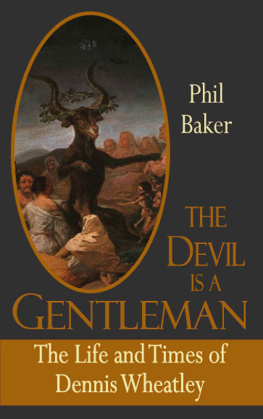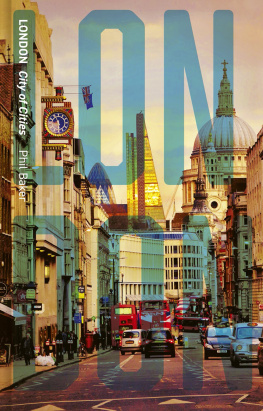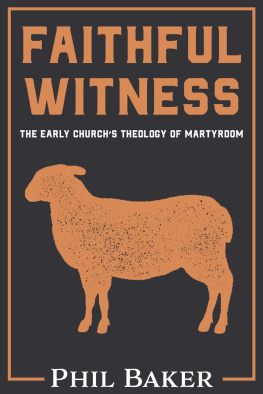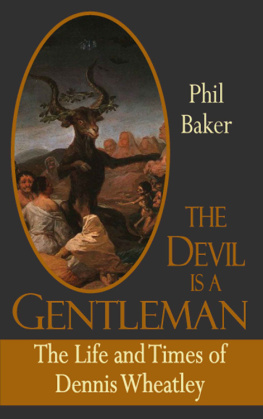
The Devil is a Gentleman
Dennis Wheatleys novels were enormously successful. It is not difficult to see why. He provided clear conflicts of Good and Evil and had a talent for nailing archetypes, coupled with a simple determination to entertain Wheatley is almost forgotten today and one might wonder if there is a case for 609 pages about him. In fact Phil Baker, critically sifting the evidence and placing Wheatley with perfect accuracy in the English class system, makes his case admirably. He provides us with a good story, well told, and plenty of jokes. Wheatley would have been delighted.
S.E.G. Hopkin in The Spectator
It is lively and full of period evocation. Baker takes an amused, pin-pricking but affectionate stance towards his subject.
Peter Lewis in The Daily Mail
Phil Bakers The Devil Is a Gentleman recounts the extraordinary life of Britains most prolific occultist, Dennis Wheatley.
Rowan Pelling in Books of the Year in The Daily Telegraph
A fantastically entertaining biography of one of the most popular writers of the twentieth-century whose work is still part of the public imagination.
James Doyle in Book Munch
Wheatley, unusual, overripe and positively fruity by the end, cries out for contextualization. This is provided by an elegant and skilful writer, possessed of an excellent wit which he uses sparingly and only ever to precise effect. Highly sensitive to period, Baker deals with areas such as appeasement and anti-Semitism (not a Wheatley failing) with much more intelligence than is usually encountered.
H.E. Taylor in The Anthony Powell Society Newsletter
He, of all people, deserves to come back from the dead and win a new following of thrill-starved souls in thrall to his dark magic.
The Oldie
Wheatley took up writing when the family wine business failed, and his mixture of sex, sadism, snobbery and Satanism proved irresistible to the reading public.
Stephen Holden in The Chap
Here is a masterful account of a writers internal and external selves, revealing the degree to which any creative authors life must necessarily be a work of fiction. Baker as a biographer, frankly, is some kind of God-damned life-archaeologist, approaching the famed occult novelist as a real, seriocomic man who was far more than the sum of his parts. It is difficult to imagine a more sensitive and knowledgeable investigation. Black magic stories? That was the least of it: the reader is left far more astonished by the magic Wheatley wove around his own life, as revealed by Baker. Superb, concise, insightful and sublime.
Jay Rath in The Fortean Times
Phil Baker recounts some wonderfully funny moments. A plethora of witty asides, and a cast of nutters beyond anything Wheatley ever invented, add up to a very entertaining read.
Mick Herron in The Bookdealer
Like Maugham, Greene and Le Carr, Wheatleys career was influenced by his intelligence contacts, as was that of another writer whose debt to him is nearly always overlooked. Ian Fleming stripped down Wheatleys model to three essentials identified by Cyril Connolly as the winning formula for the Bond series: sex, snobbery and sadism.
Chris Petit in The Guardian
Phil Bakers knockout The Devil Is A Gentleman gives us the biography of Dennis Wheatley, war propagandist and author of Satanic novels read by millions but loathed by critics.
Christopher Fowler
The war was the high point of Wheatleys life; its also the high point of Bakers biography.
Robert Hanks in The London Review of Books
its lively, racy reading throughout. An enjoyable read, especially for those of us who remember all those occult novels as a guilty adolescent pleasure. As David Blundy of the Observer once wrote: Wheatley has been grappling with the Devil for over thirty years now, and frankly, the Devils been pretty decent about it.
David Langford in Murky Depths
For N.C.
Writing a book is a horrible, exhausting struggle, like a long bout of some painful illness, wrote George Orwell. One would never undertake such a thing if one were not driven on by some demon
One of the rewards of this struggle is meeting some excellent people, and I must particularly thank Charles Beck, Roger Dobson, Richard Humphreys, Anthony Lejeune, Ian Sayer, and Timothy dArch Smith for their invaluable help.
I am also very grateful in various ways to Bob Anderson, Michael Barber, Louis Barfe, Derek Bradley, Bill Breeze, Bryan Clough, Nicholas Culpeper, Linda Donald, Jeremy Duns, Geoffrey Elborn, Mari Evans, Giles Foden, Nigel Fountain, Keith Hargreaves, Tamsen Harward, Iwan Hedman-Morelius, Michael Horniman, Andrew Jefford, Steve Kandell, Jane Lewis (ne Tombe), Patrick Matthews, Benedicte Page, Liz Parratt, Mark Pilkington, Ian Pindar, Robert Potts, Jon Preece, Isabel Quigly, Sandy Robertson, the late Bob Rothwell, Hilary Rubinstein, David Rule, Helmut Schwarzer, Derek Slavin, Jamie Sturgeon, Stephen Whatley, Paul Willetts, Derek Witty, Lizzie Wright, Cheryl Younson and, of course, Sheena.
Philip Brown of Blackwell Rare Books very kindly presented me with a copy of Catalogue A1136 from 1979 an essential item for anyone interested in Wheatley and helped with the questions it raised. Robert Hardy and Oliver Irvine of Maggs Bros showed me Wheatleys manuscript of Of Vice and Virtue (Ayesha), courtesy of the Wormsley Library.
Research is one of the more enjoyable parts of writing, and I am indebted to the following people and institutions, visited or corresponded with: Sara Land of the Brotherton Library; Janet McMullin of Christ Church Library; Jan Piggot of Dulwich College Archives; Penelope Hatfield of Eton College Archives; Imperial War Museum Library; C. J. Roberts of the Marine Society; Sheila Knight and other staff at the Public Record Office; Jean Rose of Random House Archives; Pamela Clark of The Royal Archives; Malcolm Brown of the St Johns Wood Society; Professor William Ryan at the Warburg Institute; Westminster Local Studies Library; the Wiener Library; Geoffrey Dunster of the Old Worcesters; and the Wormsley (Getty) Library. I also used the British Library, and above all the irreplaceable London Library (in the words of Borges, I have always imagined that paradise will be a kind of library.)
Wheatley always liked to belong, and in pursuit of this strand of the story I want to thank R. T. Smith of Boodles; Graham Snell of Brookss; Betty Beesley of the Garrick; Peter Bond of the Savage; David Anderson of Whites; Christopher Denvir of the Royal Society of Arts; Maggie Ferguson and Julia Abel Smith of the Royal Society of Literature; Ilene Wilson of the Royal Society of St George; and particularly Merlin Holland of the Saintsbury Club.
I was helped financially during the long haul of this book by the Authors Fund, the Royal Literary Fund, and the Wingate Foundation. It is very encouraging to receive awards from such bodies, and their role in keeping writers from despondency as well as financial ruin is probably under-recognised. I am doubly grateful to them.
Last but, in fact, foremost I should like to thank Dennis Wheatleys family, particularly Anthony, Annette, and Dominic, for their hospitality and generosity with their time.
*
Unpublished material from Aleister Crowley, Tom Driberg, Eric Gordon Tombe and Dennis Wheatley is quoted by gracious permission of Hymenaeus Beta of the Ordo Templi Orientis, David Higham Associates, Jane Lewis, and the Wheatley family, respectively. The author and publishers would be glad to hear from any other copyright holders that they have been unable to trace.
Next page





